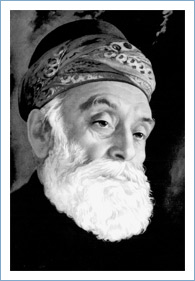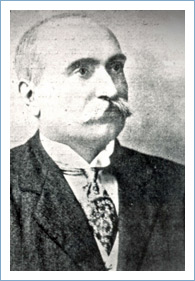 J. N. Tata (1839-1904)
J. N. Tata (1839-1904)Born on March 3, 1839, in Navsari, a small town of Gujarat, Jamsetji was the first child and the only son of Nusserwanji Tata, the head of a family of Parsee priests. It was only natural that Jamsetji, would join the family priesthood. However, the enterprising youngster broke the tradition to become the first member of the family to try his hand at business.
Completing his education from Elphinstone College, Mumbai, Jamsetji joined his father who ran a small firm. An eager learner, he soon became a skillful practitioner of various nuances of business. Armed with knowledge and experience of commodities and markets, trading and banking, in 1868, Jamsetji started a trading company with a capital of Rs. 21,000. He was just 29 then and wiser for the experience garnered by nine years of working with his father. Expanding his business portfolio, Jamsetji thereafter set foot into the textile industry in 1869 with a series of successful ventures.
Jamsetji's interest in iron and steel stirred when he attended a lecture by Thomas Carlyle in Manchester where he went to check out some new machinery for his textile mill. By the end of the trip, he was sufficiently excited by the prospects of setting up a steel plant and by 1880, his dream of building a steel plant that would compare with the best of its kind in the world was steadfast.
From 1880 till his death in 1904, his entire being had concentrated solely on three missions of his life – setting up an iron and steel company, generating hydroelectric power, and creating a world-class educational institution that would enrich Indian minds in the field of the sciences.
The enormity of Jamsetji's vision was apparent in the entrepreneurial quality of the man. Even long before any of these companies which he envisioned were established, Jamsetji had thought about the welfare of his employees. He also envisioned a planned city with a lot of greenery surrounding his operations. The city thus born out of his vision in the later years, under the aegis of Sir Dorabji Tata aptly came to be called 'Jamshedpur'.
It was in 1892 that Jamsetji established the J N Tata Endowment that helped Indian students to pursue higher studies abroad. The Indian Institute of Science in Bangalore was also conceived with similar focus where Jamsetji assured Rs. 30 Lakhs from his personal fortune.
On the business front, amongst the various projects that Jamsetji had initiated were the Hydroelectric Power Plant project and the Taj Mahal Hotel in Mumbai. If stories are to be believed then the roots of the Taj Mahal project are beached on an incident where Jamsetji was denied entry into a city hotel for being an Indian. It was following this incident that Jamsetji decided to construct an equally luxurious and lavish hotel for all fellow Indians. By the time the Taj Mahal Hotel was completed in 1903, it was the finest luxury hotel and the first building in Bombay that used electricity.
Jamsetji's business accomplishments shrouded the assortment of passions and commitments that he carried and nurtured across a fascinating life. His was a mind constantly seeking knowledge and daring to push the frontiers of achievement. Leaving behind this unique legacy with his successors and a strong blueprint for a socio-economically prosperous nation, Jamsetji Tata left for his heavenly abode in Germany in 1904.
 Dorabji Tata (1859-1932)
Dorabji Tata (1859-1932)Born in 1859, Dorabji received his primary education at Proprietary High School, Bombay after which he was sent to England where he was privately tutored. At the age of 18, he joined the Gonville and Caius College at Cambridge. Abiding by the wish of his grandfather, Dorabji returned to India in 1879 and enrolled himself in the St. Xavier's College Bombay.
Starting as a journalist with the 'Bombay Gazette', Dorabji gradually grew a liking for his ancestral business, and it was in 1884 that he joined the cotton division of his father's firm. Taking on new business challenges and drawing inspiration from these, Dorabji was sent to Mysore to investigate the possibility of an expansion in the area. Dorabji was swift in preparing his report and getting the Government sanction to set up mills there.
With his spirits high, Dorabji took on his shoulders the responsibility of realising his father's vision of harnessing the water resources of the Western Ghats for hydro-electric power. The idea was to power the industries with clean and inexpensive hydroelectricity and convert the city of Bombay into a 'Smokeless City'. Thus, was born the 'Tata Hydro-Electric Power Supply Company'. The two prime companies established by Dorabji Tata - 'Tata Power' and 'Tata Steel' - are an integral part of the Tata group today.
Under the leadership of Dorabji Tata, the Tata group experienced immense expansion. From just three cotton mills and the Taj Mahal Hotel in Bombay, the firm spread its wings rapidly and soon grew to become the largest business house in the country. Additions made under Dorabji's management were an integrated steel plant, three hydroelectric power companies, a large edible oil and soap company, two cement companies and also the aviation unit pioneered by JRD Tata. Dorabji also saw the establishment of the Indian Institute of Science, Bangalore, which became the pioneer scientific research center in India.
Apart from being an extraordinary industrialist, Dorabji had multiple interests, which he pursued through various endeavours. He took measures to enhance the athletic talent in India and also initiated to introduce the nation to the 'Olympic Movement'. Holding the position of the President of the Indian Olympic Association, Dorabji financed the Indian contingent to the Paris Olympiad in 1924. He also became a member of International Olympic Committee.
Dorabji Tata established the 'Lady Tata Memorial Trust' in fond memory of his wife Meherbai Tata who died of leukemia in 1931. The Trust was established in order to advance the study into various diseases related to blood. In 1932, he established a trust fund which was to be used for the advancement of research, for disaster relief and other humanitarian purposes. This trust came to be known as the 'Sir Dorabji Tata Trust'. It is believed that Sir Dorabji had invested all his assets and wealth into this trust.
The legend, Sir Dorabji Tata, who is known for his immense contribution to the progress and well-being of the Tata Empire, breathed his last in Bad Kissingen, Germany on 3rd June 1932. He is buried alongside his wife in the Brookwood Cemetery, England.